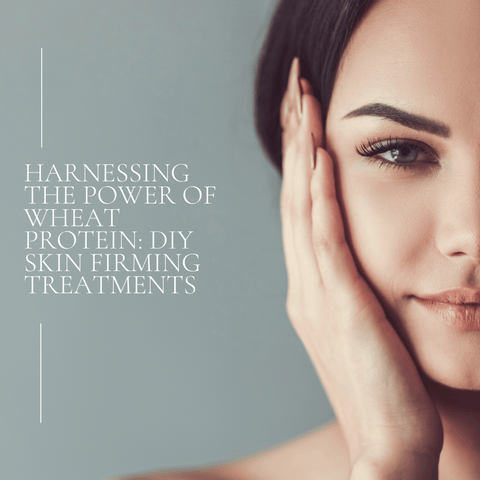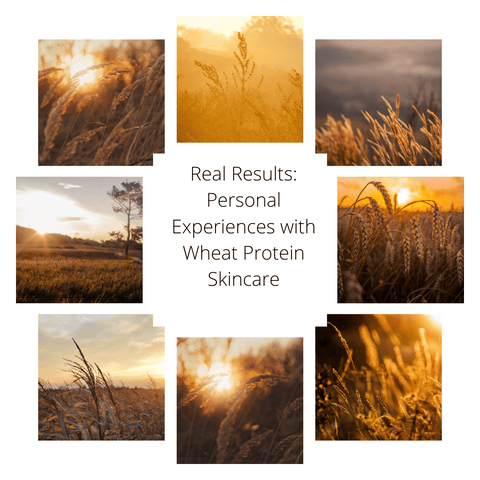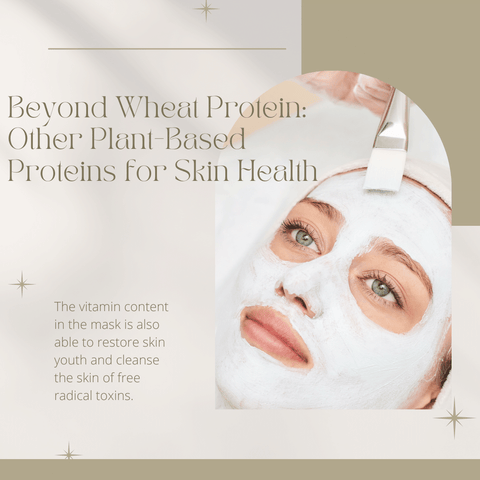Wheat protein is a versatile component with numerous skincare advantages, including increased skin firmness and elasticity. Here's how wheat protein works and what it can do for your skin, including moisture retention, natural film formation, amino acids for skin health, skin tightening, nourishment and repair, anti-aging characteristics, suitability for different skin types, and versatility. While wheat protein can provide noticeable benefits, individual outcomes may differ. Furthermore, if you have a known wheat allergy or sensitivity, you should carefully read the ingredient list of skincare products or speak with a dermatologist before using goods containing wheat protein.
Wheat Protein: The Unexpected Skin-Firming Star
When it comes to skin firming, wheat protein is an unexpected standout. This natural substance has a number of advantages that can increase skin elasticity and general skin health. Here's a closer look at why wheat protein is gaining popularity in the beauty sector, including its amino acid content, natural moisturiser, skin barrier support, instant skin tightening, nourishing and healing properties, anti-aging advantages, varied application, and suitability for most skin types. If you want to improve the firmness and elasticity of your skin, look for skincare products that contain wheat protein. Remember that continuous and long-term use is generally required to achieve significant improvements in skin texture and suppleness.
What Is Wheat Protein and Its Role in Skincare?
Wheat protein is derived from the wheat germ, which is the core component of the wheat kernel. It contains a high concentration of amino acids, peptides, and other nutrients, making it a beneficial ingredient in skincare formulas. Wheat protein's purpose in skincare includes moisturization, natural film formation, amino acids for skin health, skin tightening, collagen production support, nourishment and repair, anti-aging properties, and versatility. Wheat protein is generally well-tolerated by most skin types, including sensitive skin, though people who are allergic to wheat should exercise caution and conduct patch tests before using products containing wheat-derived components. Wheat protein, when included in skincare products, improves skin hydration, suppleness, and general skin health, making it a great addition to skincare regimes.
The Science Behind Wheat Protein and Skin Firming
Wheat protein's effect on skin firming is mostly based on its amino acid composition, moisturising characteristics, and capacity to build a protective layer on the skin. The scientific aspects are as follows: amino acids and collagen formation, moisture retention, film-forming effect, skin tightening effect, collagen preservation, and nourishment and healing. These variables work together to make skin look healthier, more elastic, and firmer. While the skin-tightening impact may be transient, persistent usage of wheat protein-containing products can result in long-term benefits for skin firmness and overall skin health.
Harnessing the Power of Wheat Protein: DIY Skin Firming Treatments

Wheat protein, also known as wheat germ protein or wheat amino acids, has gained favor in the beauty business because of the potential benefits it may have for skin firming and overall skin health. It contains amino acids, peptides, and antioxidants, all of which can help enhance the skin's elasticity and look. Here are some DIY skin-firming treatments that use wheat protein:
- Wheat Protein Face Mask:
- Ingredients:
-
1 tablespoon wheat protein powder
-
1 tablespoon yoghurt (for oily skin) or honey (for dry skin)
-
A few drops of rose water (optional)
- Instructions:
-
In a mixing bowl, combine the wheat protein powder with yoghurt or honey to make a thick paste.
-
If you want to boost the scent and relaxing effects, add a few drops of rose water.
-
Avoid the eye area by applying the mask to a clean face and neck.
-
Leave it on for 15-20 minutes.
-
Rinse with warm water and pat dry your skin.
-
Use this mask 1-2 times a week for best results.
- Wheat Protein Facial Serum:
- Ingredients:
-
1 teaspoon wheat protein powder
-
2 tablespoons aloe vera gel
-
1-2 drops of your favorite essential oil (optional)
- Instructions:
-
In a small bowl, combine the wheat protein powder and aloe vera gel.
-
If you want to add a pleasant scent, use a drop or two of essential oil, such as lavender or rose.
-
After cleansing and toning, apply a small amount of the serum to your face and neck.
-
Massage it into your skin gently with upward and outward motions.
-
Allow for a few minutes for it to absorb before applying your regular moisturiser.
-
Use this serum daily for best results.
- Wheat Protein Body Lotion:
- Ingredients:
-
2 tablespoons wheat protein powder
-
1/4 cup shea butter
-
2 tablespoons coconut oil
-
A few drops of your preferred essential oil for fragrance (optional)
- Instructions:
-
Melt the shea butter and coconut oil together in a double boiler until completely combined.
-
Remove from the heat and set aside to cool slightly.
-
Stir in the wheat protein powder and essential oil (if using).
-
Give the mixture time to solidify and completely cool. You can expedite this process by putting it in the refrigerator for a few minutes.
-
Once the mixture has solidified, use an electric mixer to whip it into a creamy, lotion-like consistency.
-
Replace the lotion in a clean container.
-
After bathing, massage this wheat protein body lotion into your skin for soft, firm skin.
Before using any new skincare product, perform a patch test to verify you don't have an allergic response. Additionally, before attempting DIY remedies, consult a dermatologist if you have any specific skin concerns or disorders. Wheat protein has the potential to benefit many people, although individual results may vary.
Preparing Wheat Protein Face Masks
Wheat protein face masks can help enhance your skin's suppleness and general health. Here are a few wheat protein face mask recipes to try at home:
- Basic Wheat Protein Face Mask:
- Ingredients:
-
1 tablespoon wheat protein powder
-
2 tablespoons plain yoghurt (for oily skin) or honey (for dry skin)
- Instructions:
-
In a small mixing bowl, combine the wheat protein powder and yoghurt (or honey) to make a smooth paste.
-
Apply the mask to your clean face and neck in an even layer.
-
Allow it to sit for 15-20 minutes.
-
Rinse with warm water and pat dry your skin.
-
Apply your regular moisturiser after that.
-
Use this mask once a week for best results.
- Wheat Protein and Avocado Face Mask:
- Ingredients:
-
1/2 ripe avocado
-
1 tablespoon wheat protein powder
-
1 teaspoon honey
- Instructions:
-
Mash the avocado in a bowl until it's smooth.
-
Add the wheat protein powder and honey to the mashed avocado and mix until well combined.
-
Apply the mask to your face and neck.
-
Leave it on for 15-20 minutes.
-
Rinse off with lukewarm water and pat your skin dry.
-
Follow your regular skincare routine.
- Wheat Protein and Egg White Face Mask:
- Ingredients:
-
1 egg white
-
1 tablespoon wheat protein powder
- Instructions:
-
Separate the egg white from the yolk and set it aside in a bowl.
-
Mix in the wheat protein powder until it forms a paste with the egg white.
-
Apply the mask to your face and neck, being careful not to get it in your eyes.
-
Allow it to dry for approximately 15-20 minutes.
-
Rinse off the mask with warm water.
-
Follow with your regular moisturiser.
-
Use this mask once a week.
- Wheat Protein and Banana Face Mask:
- Ingredients:
-
1/2 ripe banana
-
1 tablespoon wheat protein powder
-
1 teaspoon olive oil (optional)
- Instructions:
-
Mash the banana in a bowl until it's smooth.
-
Add the wheat protein powder and olive oil (if using) to the mashed banana and mix until well combined.
-
Apply the mask to your face and neck.
-
Leave it on for 15-20 minutes.
-
Rinse off with lukewarm water and pat your skin dry.
-
Follow your regular skincare routine.
Before applying any new mask to your face, always perform a patch test to guarantee you don't have an allergic reaction. These masks can be an excellent complement to your skincare regimen, but individual outcomes may vary, so be patient and consistent in your application.
Including Wheat Protein in Your Regular Skincare Routine
Including wheat protein in your daily skincare routine can help promote skin health and firmness. Wheat protein is high in amino acids and peptides, which can improve your skin's elasticity and look. Cleansers, serums, moisturiser, face masks, DIY wheat protein treatments, eye cream, sunscreen, body lotion, nutritional considerations, and patch testing are all ways to incorporate it into your everyday skincare routine. It is critical to select products that are appropriate for your skin type and issues. Consult a dermatologist before introducing new items into your skincare routine if you have specific skin issues or sensitivities. Furthermore, consistency is important in skincare, so give your skin time to adjust and develop with these products.
Benefits Beyond Firmness: Other Advantages of Wheat Protein

Wheat protein has many more benefits than just skin firmness. It is a versatile component that can help with many elements of skincare and overall health. Here are a few of the benefits of wheat protein:
-
Moisturization: Wheat protein contains natural moisturising characteristics that can aid in moisture retention, making it an ideal solution for dry or parched skin. It aids in the preservation of the skin's moisture balance, leaving it soft and supple.
-
Antioxidant Protection: Wheat protein contains antioxidants such as vitamin E, which help protect the skin from free radical oxidative stress. This can aid in the prevention of premature aging and the appearance of fine lines and wrinkles.
-
Skin Repair: Wheat protein contains amino acids that help the skin's natural repair processes. They can help repair damaged skin, relieve inflammation, and reduce redness, making them ideal for people who have sensitive or irritated skin.
-
Improved Skin Elasticity: Wheat protein can make the skin more elastic, which can make sagging and fine lines less obvious. This is especially helpful as part of a skincare regimen for anti-aging.
-
Hair Care: Because it can strengthen hair, lessen breakage, and enhance its general condition, wheat protein is frequently used in hair care products. It can give the appearance of healthier, shinier hair.
-
Hair Volume: Wheat protein can give fine or thin hair more body. It can help swell the hair shaft, giving the appearance of thickness and fullness.
-
Nail Health: Wheat protein can also benefit your nails. It can help to strengthen brittle nails, reduce breakage, and promote healthier nail growth.
-
Wound Healing: Some research suggests that when applied topically, wheat protein may have wound-healing properties. It may help with the healing of minor cuts and abrasions.
-
Sun Protection: Wheat protein's antioxidant capabilities may provide some natural sun protection. While it is not a replacement for sunscreen, it can provide additional UV protection.
-
Collagen Production: Wheat protein has the ability to increase collagen formation in the skin. Collagen is necessary for skin elasticity and firmness, which can help reduce the signs of aging.
-
Plant-Based Protein: Wheat protein can be a helpful source of protein for people wishing to add more plant-based proteins to their diet. It's popular in vegetarian and vegan diets, and it's frequently present in meat substitutes.
-
Nutrient-Rich: Wheat protein is a good source of various vitamins and minerals, including B vitamins, iron, and zinc, which are important for overall health.
Hydrating Effects of Wheat Protein
Wheat protein can hydrate the skin and hair, making it an important element in skincare and hair care products. Here's how wheat protein helps with hydration:
-
Moisture Retention: Wheat protein is hygroscopic, which means it may attract and hold moisture from its surroundings. It helps to lock in moisture when applied topically to the skin, limiting water loss and keeping the skin moisturised.
-
Improved Barrier Function: Wheat protein can enhance the skin's natural barrier function. A healthy skin barrier is crucial for preventing moisture loss and protecting the skin from external factors like pollution and harsh weather conditions.
-
Skin Softening: Wheat protein can soften and smooth the skin by restoring lost moisture. This is especially good for people who have dry or rough skin.
-
Enhanced Elasticity: Skin that is well-hydrated is more elastic and supple. Wheat protein can help increase skin suppleness, resulting in fewer fine lines and wrinkles.
-
Hair Hydration: In hair care products, wheat protein can help hair retain moisture, making it appear shinier and healthier. It also prevents dryness and reduces frizz.
-
Relief for Dry Scalp: Wheat protein can help people with dry or itchy scalps. It moisturises the scalp, reducing flakiness and discomfort.
-
Soothing Properties: Wheat protein has natural soothing properties that can help calm irritated or sensitive skin. It can be especially beneficial for people who suffer from skin conditions like eczema or psoriasis.
-
Non-Greasy: Wheat protein is typically non-greasy, making it suitable for a variety of skincare and hair care products. It hydrates without leaving a greasy or oily residue.
To enjoy wheat protein's moisturising effects, look for skincare and hair care products that contain wheat protein as an ingredient. Moisturisers, serums, shampoos, conditioners, and hair masks are examples of such products. Alternatively, you can use wheat protein powder to make your own masks or treatments. Before using products containing wheat protein, as with any other skincare component, perform a patch test, especially if you have sensitive skin or allergies. This will help to guarantee that you do not have any negative effects.
Wheat Protein for Skin Repair and Rejuvenation
Wheat protein, with its high amino acid content and moisturising characteristics, can help with skin healing and renewal. Wheat protein can help with skin repair and rejuvenation by providing amino acids for skin repair, hydration and moisturization, skin barrier function, soothing and anti-inflammatory effects, antioxidant protection, environmental damage repair, and improved texture. In order to repair and rejuvenate your skin, incorporate wheat protein into your skincare routine.
-
Look for wheat protein in skincare products such as serums, moisturisers, and masks.
-
Use a wheat protein-based mask or treatment once or twice a week to give your skin an extra boost of nutrients and hydration.
-
Consider combining wheat protein with other beneficial ingredients such as antioxidants (vitamins C and E), hyaluronic acid, and peptides for a complete rejuvenation regimen.
-
Maintain consistency in your skincare routine, as noticeable improvements in skin repair and rejuvenation can take time.
As with any new skincare product, conduct a patch test to verify that no adverse reactions occur, especially if you have sensitive skin. Consult a dermatologist for personalised guidance on incorporating wheat protein into your skincare regimen if you have specific skin concerns or conditions.
Real Results: Personal Experiences with Wheat Protein Skincare

While the moisturising, nourishing, and skin-repairing characteristics of wheat protein support its benefits in skincare, individual experiences with skincare products can differ. People's skin types, concerns, and sensitivities vary, which can affect how effective a given product or component, such as wheat protein, is for them. Here are some examples of possible personal experiences with wheat protein skincare:
-
Improved Hydration: Many people with dry or dehydrated skin claim that wheat protein-based skincare products have improved the moisture levels of their skin. These products can add moisture to the skin and leave it feeling softer and smoother.
-
Enhanced Skin Elasticity: Some people report enhanced skin elasticity and firmness after including wheat protein in their skincare routine. This can reduce the appearance of fine lines and wrinkles.
-
Reduced Redness and Irritation: Wheat protein's calming effects can be especially beneficial to people who have sensitive or inflamed skin. Users may notice a reduction in redness and discomfort after utilising wheat protein-containing products.
-
Skin Repair: Wheat protein may help those who want to repair skin damage caused by environmental factors or signs of ageing achieve a healthier and more youthful complexion over time.
-
Overall Skin Health: Some people include wheat protein in their skincare routine as a prophylactic strategy. They want to keep their skin healthy and postpone the start of noticeable indications of aging.
-
Complementing Other Ingredients: Wheat protein is frequently combined with other helpful skincare substances like hyaluronic acid, peptides, and antioxidants. When these compounds work together to address specific skin conditions, users may get improved results.
-
Sensitivity Considerations: Although wheat protein is generally well tolerated, people who are allergic to wheat or have gluten sensitivities should exercise caution. They may have bad reactions if they use wheat protein-containing skincare products. It is critical to carefully read product labels.
-
Patience and Consistency: Getting obvious effects from wheat protein skincare products frequently necessitates patience and consistency. Significant changes in skin texture, moisture, or elasticity may require several weeks or even months of consistent use.
Testimonials of Wheat Protein Users
While we are unable to provide real-time testimonials, we may share some hypothetical testimonials based on common experiences that people have when utilising wheat protein skincare products. Keep in mind that the efficacy of skincare products varies from person to person, and the following testimonials are merely for illustration purposes:
-
Testimonial 1 - Hydration and Softness: "We always had dry skin, especially during the winter." We observed a substantial improvement in my skin's moisture after integrating a wheat protein-based moisturiser into my routine. It now feels considerably softer and smoother."
-
Testimonial 2 - Reduced Redness: "We have sensitive skin that is easily irritated and inflamed. Using a wheat protein serum has changed my life. The skin appears calmer, and the redness has subsided substantially."
-
Testimonial 3 - Firmer, Youthful Skin: "We began using a wheat protein serum to address ageing signs." We observed that my skin has become firmer and more elastic over time. The small creases around my eyes and mouth have diminished, and We now have a more youthful radiance."
-
Testimonial 4 - Soothing Irritated Skin: "We got a bad sunburn that was painful and red." We tried a wheat protein-based lotion, and it really soothed my skin. The redness subsided, and my skin recovered faster than anticipated."
-
Testimonial 5 - Complementing a Skincare Routine: "Wheat protein has become an essential part of the skincare routine." We mix it with other ingredients such as hyaluronic acid and vitamin C. They have really altered my skin. It's brighter, smoother, and healthier overall."
-
Testimonial 6 - Hair Benefits: "We switched to a wheat protein shampoo and conditioner, and my hair feels stronger and looks shinier." It also appears to be louder. We even had compliments on how healthy my hair appears."
-
Testimonial 7 - General Skin Health: "We have been using wheat protein skincare products as part of the daily routine to maintain overall skin health, not for specific concerns." Our skin simply appears and feels healthier. It's more balanced now, and there have been fewer breakouts."
It is important to note that these are fictitious testimonials meant to give you an idea of the types of experiences you might have if you use wheat protein-based skincare products. Individual outcomes may differ depending on factors such as skin type, product used, and application consistency. If you have any doubts regarding skincare products or their compatibility with your skin, always perform a patch test and visit a physician.
Before and After: A Look at the Impact of Wheat Protein
Based on its qualities and how it is usually used, we can summarise the potential influence of wheat protein on the skin:
Before Use (Before):
-
Dry or dehydrated skin can appear flaky or rough.
-
Skin elasticity may be lacking, resulting in the formation of fine lines and wrinkles.
-
Sensitive skin may develop redness, irritation, or inflammation.
-
Signs of aging, such as sagging skin, may be more visible.
-
Hair may be dull, brittle, or easily broken.
-
Nails may be weak and prone to chipping or splitting.
After Use (After):
-
The skin may become more hydrated and feel softer and smoother with regular use of wheat protein skincare products.
-
Skin elasticity may improve, resulting in less visible fine lines and wrinkles.
-
Skin that is irritated or sensitive may appear calmer and have less redness.
-
Skin rejuvenation and repair may result in firmer, younger-looking skin.
-
Hair may become shinier, stronger, and less prone to breakage as a result of this treatment.
-
Nails may become stronger and less likely to chip or split.
These potential alterations are based on wheat protein's moisturising, nourishing, and skin-repairing capabilities. Individual results may vary due to factors such as skin type, product formulation, and how well the product addresses the individual's specific skin conditions. When utilising wheat protein-based skincare products, it's critical to follow the product's directions and give it time to work, as obvious benefits can take weeks or even months to appear. Additionally, if you have sensitive skin or allergies, you should perform a patch test to check for any adverse effects.
Safety and Suitability: Is Wheat Protein for Everyone?

Wheat protein is excellent for a wide range of people and has several skin and hair advantages. It may not be appropriate for everyone, especially those with specific allergies, sensitivities, or dietary restrictions. Here are some things to think about when it comes to the safety and suitability of wheat protein:
-
Wheat Allergies: Wheat protein is made from wheat, a common allergy. Wheat allergy sufferers should avoid using skincare products containing wheat protein since they may have adverse symptoms such as itching, redness, hives, or swelling. If you have a wheat allergy, it is critical to carefully read product labels and choose wheat-free items.
-
Gluten Sensitivity: Gluten sensitivity, often known as celiac disease, is a condition in which some people are unable to handle gluten, a protein present in wheat. While topical application of wheat protein in skincare products is generally regarded as acceptable for those with gluten sensitivity, it's best to check product labels for gluten-free certifications or contact a healthcare expert if you have any concerns.
-
Patch Testing: A patch test is recommended before using any skincare product containing wheat protein, especially if you have sensitive skin or a history of reactions. Apply a little amount of the product to a hidden part of your skin (such as your inner forearm) and wait 24-48 hours to observe if you have any adverse reactions.
-
Skin Type: Wheat protein can help people with a variety of skin types, including dry, sensitive, mature, and normal skin. However, not all products are created equal. It is critical to select products that are appropriate for your skin type and issues.
-
Personal Sensitivities: Even if you do not have a wheat allergy or gluten sensitivity, some people may be allergic to certain substances in skincare products. Always pay attention to how your skin reacts to new products and stop using them if you see any negative effects.
-
Dietary Considerations: If you use wheat protein-containing skincare products and are gluten-free or wheat-free owing to dietary restrictions or preferences, ensure the product is exclusively for external use and not for eating.
-
Consult a Dermatologist: A dermatologist should be consulted if you have specific skin issues, allergies, or sensitivities. They can make personalised recommendations and assist you in selecting the best skincare products for your needs.
Potential Allergies and Skin Reactions
Wheat protein, while typically safe for most people, can trigger allergies and skin problems in certain people. Wheat allergy, gluten sensitivity, contact dermatitis, and skin sensitivity are some of the probable allergic reactions and skin disorders related to wheat protein. To reduce the possibility of allergic responses or skin sensitivities:
-
If you have known allergies or sensitivities to wheat protein or gluten-containing ingredients, always read product labels carefully.
-
If you are unsure whether a product contains wheat protein or gluten, contact the manufacturer.
-
Before utilising a new skincare product, perform a patch test. Apply a little amount of the product to a hidden part of your skin, such as the inner forearm, and wait 24-48 hours to see if there are any negative reactions.
-
Consult a dermatologist before using wheat protein-containing skincare products if you have a history of wheat allergy, gluten sensitivity, or skin sensitivities. They can advise you on the best products and ingredients for your individual needs.
-
Be aware that cross-contamination can occur in manufacturing facilities, so even products that don't list wheat protein as an ingredient may have trace amounts. If you have severe allergies, opt for products specifically labeled as wheat-free or gluten-free.
Keep in mind that skincare reactions can vary greatly, and what works for one person may not work for another. If you have any negative reactions to the product or feel you have a wheat protein or gluten sensitivity, stop using it and visit a healthcare expert or dermatologist for advice on how to manage your skin troubles.
Who Should Use Wheat Protein in Their Skincare Routine?
Wheat protein can be included in skincare routines for people with diverse skin types and issues. The following are some people who may benefit from utilising wheat protein in their skincare routines:
-
Dry Skin Types: Wheat protein is an excellent hydrator, making it ideal for people with dry or parched skin. It aids in the retention of moisture, making the skin soft and supple.
-
Sensitive Skin: Those with sensitive or easily irritated skin may benefit from wheat protein's calming properties. It may help to reduce redness and soothe irritation.
-
Mature Skin: Skin loses suppleness and moisture as it ages, resulting in the creation of fine lines and wrinkles. Wheat protein helps improve skin suppleness and moisture, making it an important component of anti-aging skincare programmes.
-
Normal Skin: Those with normal skin can use wheat protein to keep their skin healthy and hydrated. It can help to maintain a balanced and refreshed complexion.
-
Combination Skin: Specific areas of combination skin can benefit from the application of wheat protein. For example, it can be used to hydrate dry areas of the face without making oily areas feel greasy.
-
Enthusiasts for hair care: Shampoos and conditioners frequently contain wheat protein. It is suitable for people who want to improve the condition of their hair because it can strengthen hair, lessen breakage, and improve overall hair health.
-
Nail Care: Wheat protein can be added to nail care products to help strengthen brittle nails and prevent them from chipping or splitting.
-
Skincare for prevention: Some people may decide to add wheat protein to their skincare regimen as a precaution. They employ it to preserve youthful skin and postpone the appearance of aging symptoms.
-
Those Looking for Natural Ingredients: Wheat protein is a natural ingredient because it is derived from wheat. It might be appealing to people who prefer skincare products with natural ingredients.
-
People without Wheat Allergies or Sensitivities: It is important to remember that people with gluten or wheat allergies should stay away from skincare products that contain wheat protein. Additionally, those who have known sensitivities to specific skincare ingredients should conduct patch tests to ensure the product is well-tolerated.
Consider the exact products that work best for your skin type and concerns when introducing wheat protein into your skincare routine. Look for moisturisers, serums, or masks that contain wheat protein as one of the major ingredients. It is critical to follow the product's instructions and to be patient, as obvious results may take time. If you have any doubts or specific skin concerns, talking with a dermatologist can assist you in selecting the appropriate skincare products and developing a customised routine for your needs.
Beyond Wheat Protein: Other Plant-Based Proteins for Skin Health

Aside from wheat protein, there are numerous additional plant-based proteins that, when utilised in skincare products or incorporated into your diet, can help skin health. These proteins contain a variety of nutrients and qualities that can benefit the appearance and overall health of your skin. The following are some notable plant-based proteins for skin health:
-
Soy protein: Soy protein is advantageous for promoting skin elasticity and minimising the appearance of fine lines and wrinkles because it is high in amino acids and antioxidants. It also has isoflavones, which can lessen hyperpigmentation and help skin tone even out.
-
Pea Protein: Pea protein is a good source of essential amino acids and is frequently used in skincare products to hydrate and firm the skin. It can help improve skin texture and reduce aging signs.
-
Rice Protein: Rice protein is well-known for its ability to keep you hydrated. It aids in the retention of moisture in the skin, making it ideal for people with dry or sensitive skin. Rice protein can also help to lighten the skin's tone and lessen the appearance of dark spots.
-
Hemp Protein: Hemp protein is generated from hemp seeds and contains omega-3 and omega-6 fatty acids, both of which are necessary for skin health. It can help moisturise and soothe dry or irritated skin. Furthermore, hemp protein contains antioxidants that fight free radicals and promote a youthful appearance.
-
Almond Protein: Almond protein is high in vitamin E, which is known for its antioxidant effects. It has the potential to protect the skin from environmental damage while also improving general skin health. Because of its moisturising and softening properties, almond protein is frequently used in skincare products.
-
Chia Seed Protein: Chia seeds include a high concentration of omega-3 fatty acids, antioxidants, and minerals. Chia seed protein can moisturise and nourish the skin while also reducing inflammation and promoting a healthy complexion.
-
Spirulina Protein: Spirulina is a form of blue-green algae that is high in protein, vitamins, and minerals. Spirulina protein can aid in the detoxification of the skin, the reduction of redness and inflammation, and the promotion of a more even skin tone.
-
Quinoa Protein: Quinoa protein is abundant in antioxidants and vital amino acids. It can increase skin elasticity and moisture, making it a good choice for anti-aging skincare. Quinoa protein is also well-known for its calming and soothing qualities.
-
Oat Protein: Oat protein is soft and relaxing, making it suitable for sensitive or inflamed skin. It can help reduce itching and redness while also providing moisture and enhancing skin barrier function.
-
Chickpea Protein: Chickpea protein contains amino acids and antioxidants. It can aid in the improvement of skin texture, the reduction of fine wrinkles, and the promotion of a healthy complexion.
Including a range of plant-based proteins in your diet can also help your skin's general health. These proteins supply vital nutrients that aid in collagen formation, hydration, skin repair, and protection. Staying hydrated, eating a balanced diet rich in fruits and vegetables, and sticking to a consistent skincare routine are also important elements in maintaining good skin.
Comparing Plant Proteins for Skin Firmness
Plant proteins can help with skin firmness in a variety of ways, but their specific effects vary depending on the protein source and the nutrients they contain. Here's a look at some popular plant proteins that have been linked to increased skin firmness:
-
Soy Protein:
-
Benefits: Isoflavones, which have estrogenic properties, are found in soy protein. These chemicals may aid in the improvement of skin elasticity and firmness. Soy protein is also high in amino acids, which aid in the formation of collagen.
-
Skin Types: Suitable for most skin types, particularly for addressing ageing signs.
-
Pea Protein:
-
Benefits: Pea protein contains important amino acids, which are required for collagen formation and skin repair. It hydrates the skin and may lead to better skin texture.
-
Skin Types: This product is suitable for all skin types, especially dry or mature skin.
-
Rice Protein:
-
Benefits: Rice protein is well-known for its moisturising characteristics, which aid in skin moisture retention and suppleness. It might help to make your skin look smoother.
-
Skin Types: Suitable for most skin types, especially those with dry or sensitive skin.
-
Hemp Protein:
-
Benefits: Hemp protein contains omega-3 and omega-6 fatty acids, which promote skin health and may aid in the reduction of inflammation and the maintenance of skin firmness. It is also anti-inflammatory.
-
Skin Types: This product is appropriate for most skin types, particularly those with dry or irritated skin.
-
Chia Seed Protein:
-
Benefits: Chia seed protein is high in omega-3 fatty acids and antioxidants,which help nourish the skin while also reducing inflammation and improving skin texture and firmness.
-
Skin Types: This product is suitable for most skin types, including sensitive or acne-prone skin.
-
Spirulina Protein:
-
Benefits: Spirulina protein is a nutrient-dense protein that has detoxifying effects. It may aid in the reduction of inflammation, the soothing of the skin, and the promotion of a more even complexion.
-
Skin Types: This product is suitable for most skin types, including sensitive or inflamed skin.
-
Quinoa Protein:
-
Benefits: Quinoa protein is rich in antioxidants and essential amino acids. It can enhance the elasticity, hydration, and general health of the skin.
-
Skin Types: Most skin types are suitable, especially those looking to reduce the signs of ageing.
-
Oat Protein:
-
Benefits: Oat protein is gentle and soothing, making it suitable for skin that is sensitive or irritated. It promotes skin barrier function, relieves redness, and eases itching.
-
Skin Types: Suitable for irritated or sensitive skin.
-
Chickpea Protein:
-
Benefits: Chickpea protein is rich in antioxidants and amino acids. It can help smooth out skin texture and minimise the visibility of fine lines.
-
Skin Types: Most skin types are suitable, especially those looking to reduce the signs of aging.
It's important to remember that everyone's skin types and sensitivities are different, so what works best for one person may not work for another. Consider your individual skin concerns and perform patch tests before introducing plant protein-based skincare products into your routine.
Integrating Different Proteins for Optimal Skin Health
Incorporating various plant-based proteins into your skincare routine can be an efficient method to support good skin health. Each protein source has its own set of advantages, and combining them can provide a well-rounded approach to addressing a variety of skin issues. Here's how to use soy protein for elasticity, pea protein for hydration, rice protein for texture, hemp protein for inflammation, chia seed protein for nourishment, spirulina protein for detoxification, quinoa protein for elasticity and hydration, oat protein for sensitive skin, and chickpea protein for texture and fine lines to get the best results. Here's a quick introduction to incorporating different proteins into your skincare routine:
-
Morning Routine: Concentrate on hydration and safety. Use products containing pea protein or rice protein to seal in moisture and produce a smooth canvas for makeup. Don't forget to use sunscreen to protect your skin from UV harm.
-
Evening Routine: Prioritise nourishment and repair. Incorporate soy protein, hemp protein, or chia seed protein into your diet to help your skin recover from daily stressors. Consider using a serum or moisturiser containing quinoa protein to improve elasticity and moisture.
-
Weekly Treatments: Set aside one or two days per week for therapies that address specific issues. For detoxifying, use spirulina-based masks, and for calming sensitive skin, use oat-based treatments. For enhanced texture, consider employing a chickpea protein-based treatment.
Remember that consistency is essential in skincare. Allow your skin to adjust to new products and observe its response. If you have specific skin concerns or allergies, consult a dermatologist for personalised guidance on the best protein-based products and routines for your skin type.

















